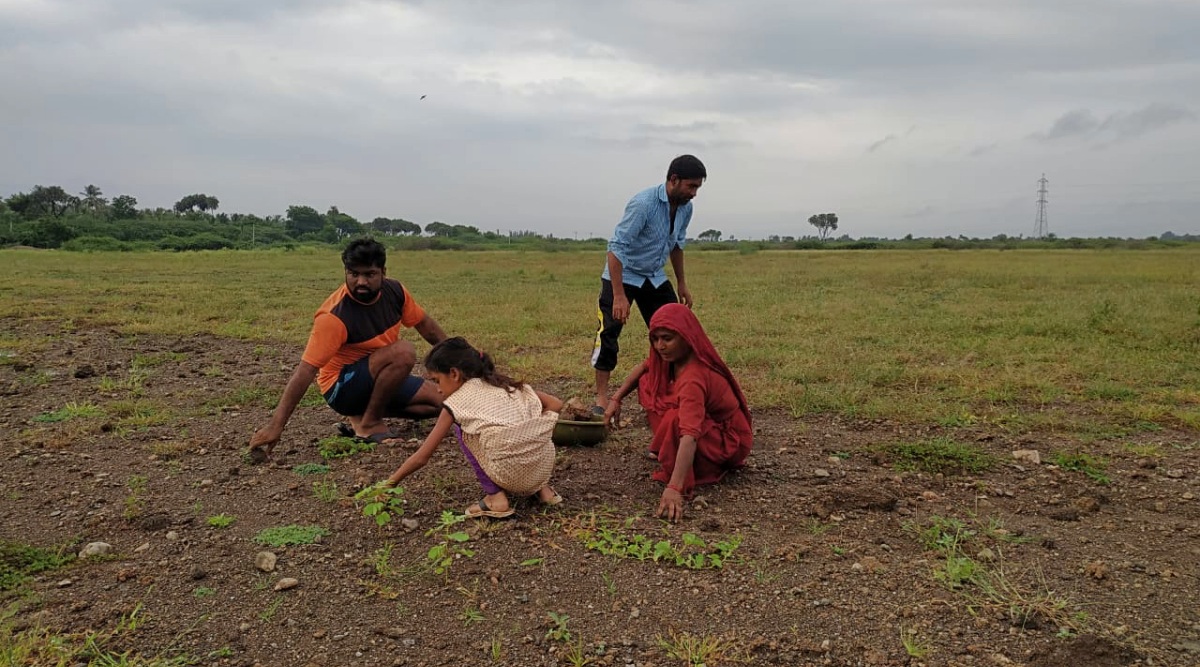
The Indian Express
8 years on, displaced Dalit family begin life afresh in Delvada village of Una
In November 2018, a special court in Una had convicted 11 men of murdering Lalji and also under the Scheduled Castes and Scheduled Tribes (Prevention of Atrocities) Act and sentenced them to life imprisonment.
by Gopal B KateshiyaEIGHT YEARS after a Dalit man was allegedly set ablaze and murdered in Ankolali village of Gir Gadhda taluka of Gir Somnath district by members of Koli community, his family is all set to begin a new life by starting to cultivate a piece of land the state government has allotted them in Delavad village in neighbouring Una taluka as part of their rehabilitation.
The family of Kalabhai Sarvaiya have started preparing around 14 bigha land for sowing Rabi crops as flooding caused by the heavy rainfall during the ongoing monsoon has started receding. “A farmer cannot live without farming. It is a relief that we are able to return to the work we love. We have already lost eight seasons, and earning they bring to a farmer,” 78-year-old Kalabhai told The Indian Express.
This is a big shift in the life Kalabhai’s 14-member Dalit family who have been struggling to find their feet since they were forced to abandon their agricultural farm and home in Anklolali eight years ago.
https://images.indianexpress.com/2020/08/1x1.png
On September 13, 2012, a mob of Kolis, who are OBC, attacked Kalabhai’s home in Ankolali over an alleged affair between Kalabhai’s son Lalji and a girl from Koli community. The mob had locked Lalji inside his home and set it ablaze, charring him to death, while also pelting stones on rest of family-members and forcing them to run for their lives. They had since been camping in Una town. Recently, they shifted to a cottage constructed on the land allotted to them by the government in Delvada village.
In November 2018, a special court in Una had convicted 11 men of murdering Lalji and also under the Scheduled Castes and Scheduled Tribes (Prevention of Atrocities) Act and sentenced them to life imprisonment.
The state government had declared the Sarvaiyas a displaced family the following year, making them eligible for rehabilitation elsewhere. But it was only after threats of self-immolation and a prolonged hunger strike by the Sarvaiyas that the state government allotted them around 14 bigha land in Delvada village in August, 2016.
The land allotment had come around a month after an alleged assault by gaurakshaks on Vashram Sarvaiya, Balu Sarvaiya and other Dalits of Mota Samadhiyala village in Una taluka led to a national outcry and brought atrocities on Dalits under media limelight.
“It was a brutal battle for us to get justice after the atrocity of the 2012. But we never said die,” Kalabhai, who has not received any formal education, further said.
Kalabhai and his youngest son Piyush were detained by police on June 24, 2016 after they announced that they would commit suicide as the government was not allotting them land and not extending rehabilitation benefits due to a displaced Dalit family. They were released from Junagadh jail on July 11, 2017, the day the Mota Samadhiyala Dalits were allegedly assaulted by cow vigilantes.
Even after allocation of land, the family had to constantly plead with the authorities to make it cultivable. “It was a government wasteland. The government dillydallied on levelling it and making it cultivable for three years. And even now, the contractor assigned this work has not brought soil from Naliya-Mandvi as was per contract specification and has instead dug out less fertile soil from elsewhere and deposited it on our land. But nonetheless, we have had enough of fighting. Now, we want to focus on farming and begin life again,” 31-year-old Piyush said.
After Vashram was assaulted and became one of the faces of the victims of the Una atrocities, he and Piyush were often seen together in making representations to government for justice. “It helped that the Mota Samadhiyala village drew top political leaders of the country to Una and plight of Dalits came under media focus. Till that time, we were fighting hard but were not getting attention either from the media or the government,” said Piyush, who has studied till Class 6.
Kalabhai’s family includes his wife Kamla (75), their sons Narendra (43) and wife Malai, Jayanti (36) and wife Vanita, Jeena (33), Piyush and six grandchildren. Lalji’s marriage had ended in a divorce before he was murered. “We are planning to sow millet and fodder for our two cows,” Piyush further said.
He added that while rest of his brothers have been working as casual labours after forced to flee their fertile land in Ankolali, he has been doing jobs of painting buildings in Una. “Our Ankolali land was very fertile whereas this land is somewhat salty. But something is better than nothing,” he said.
The government has also helped the family dig a well on their Delvada land.